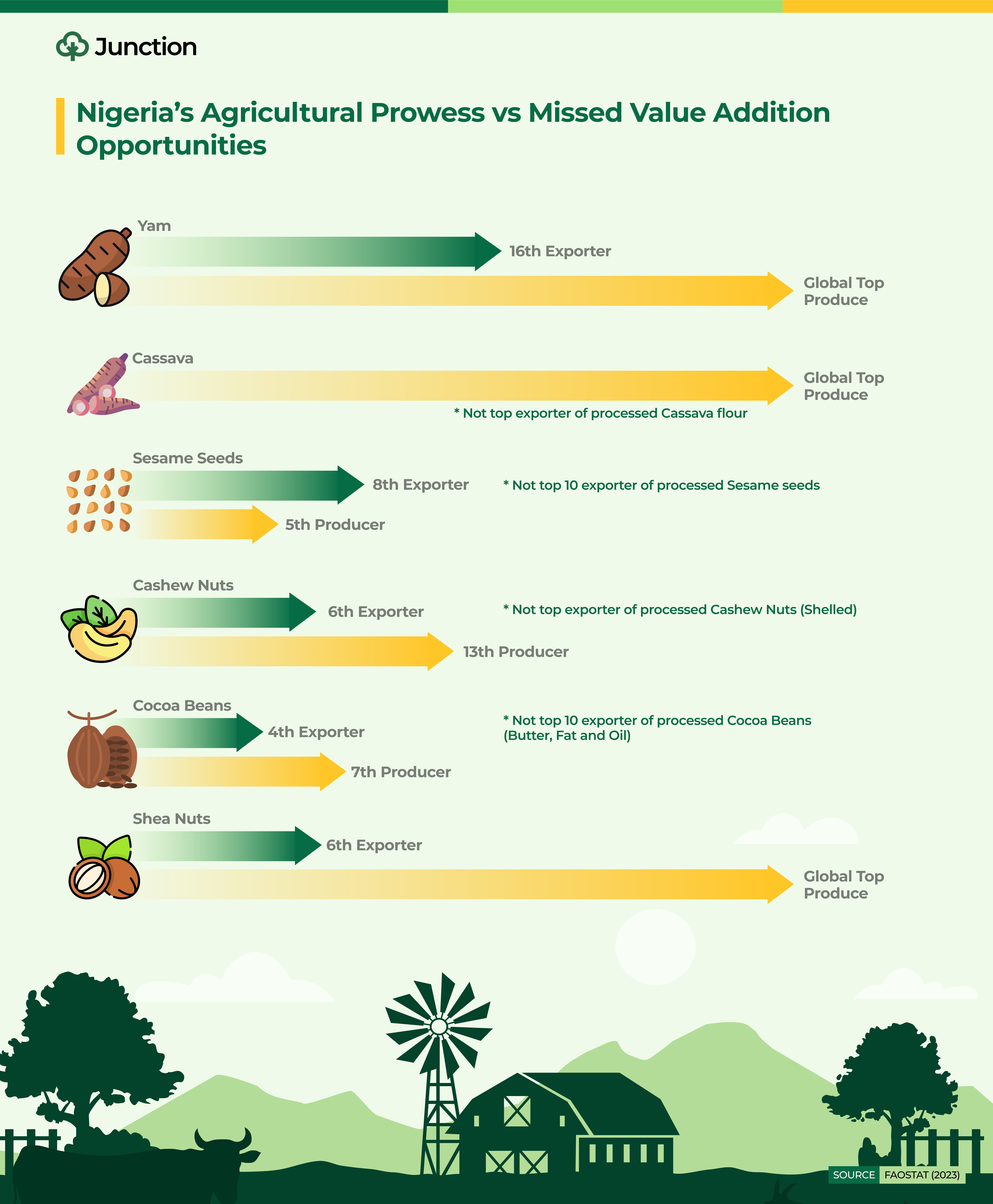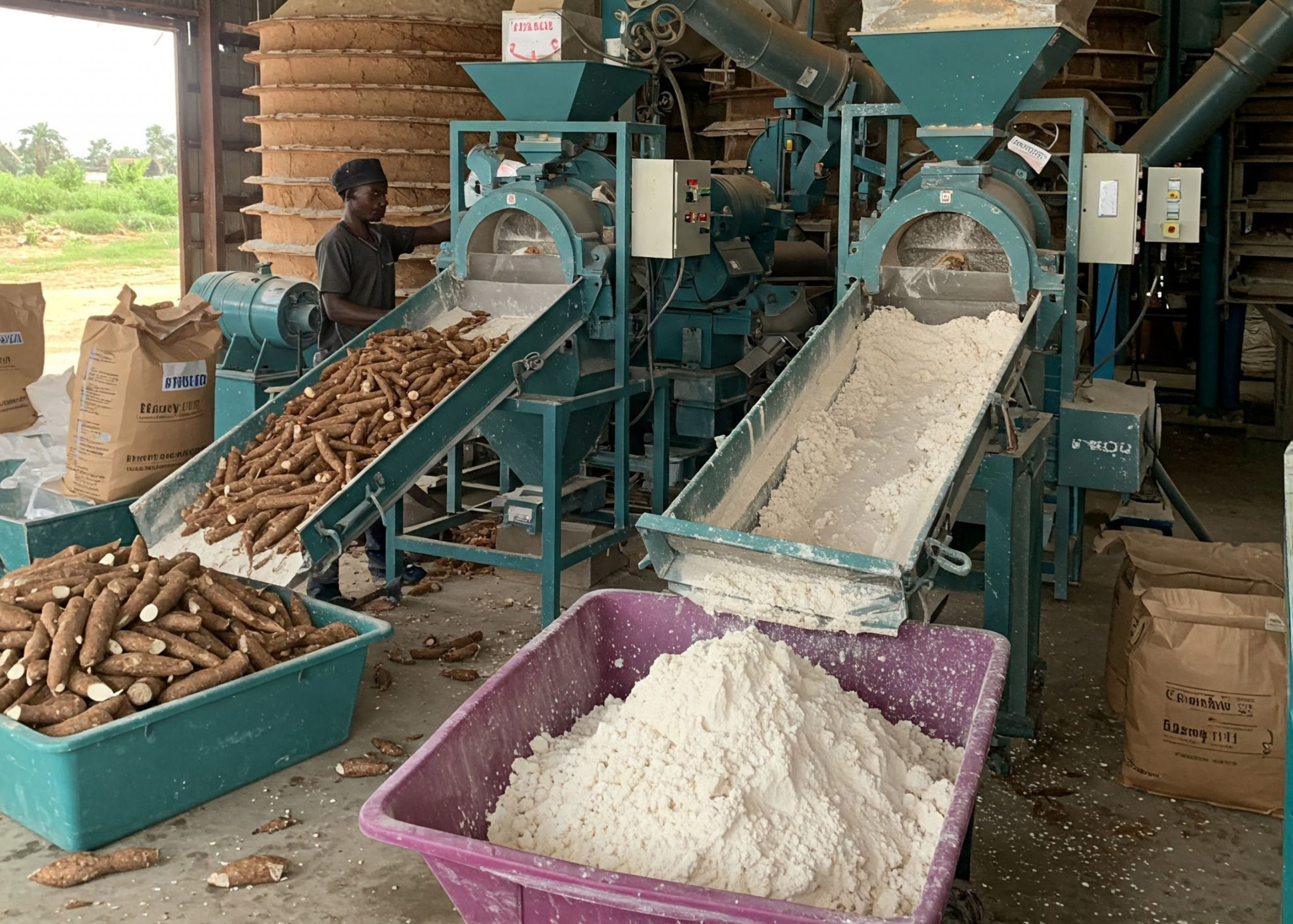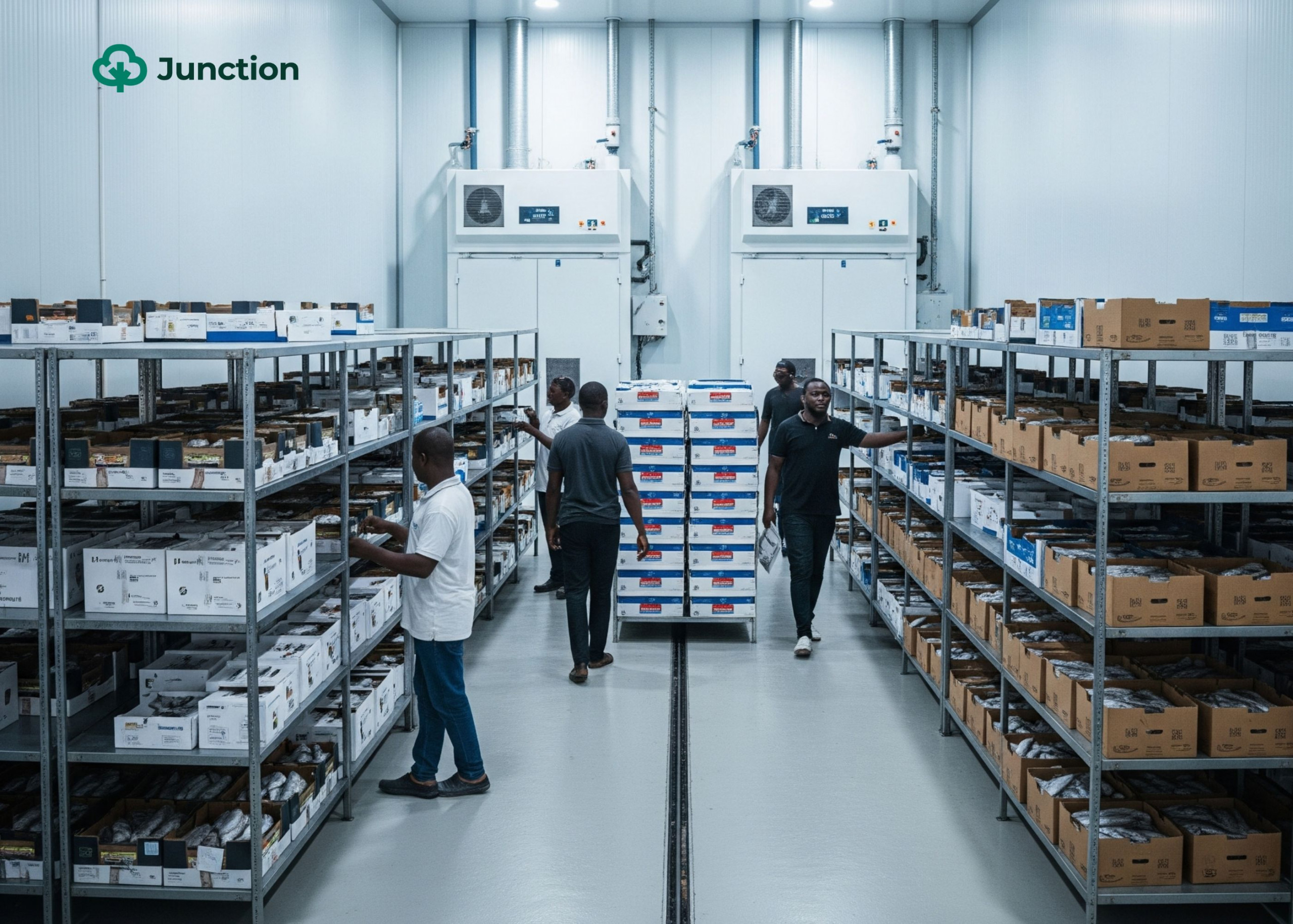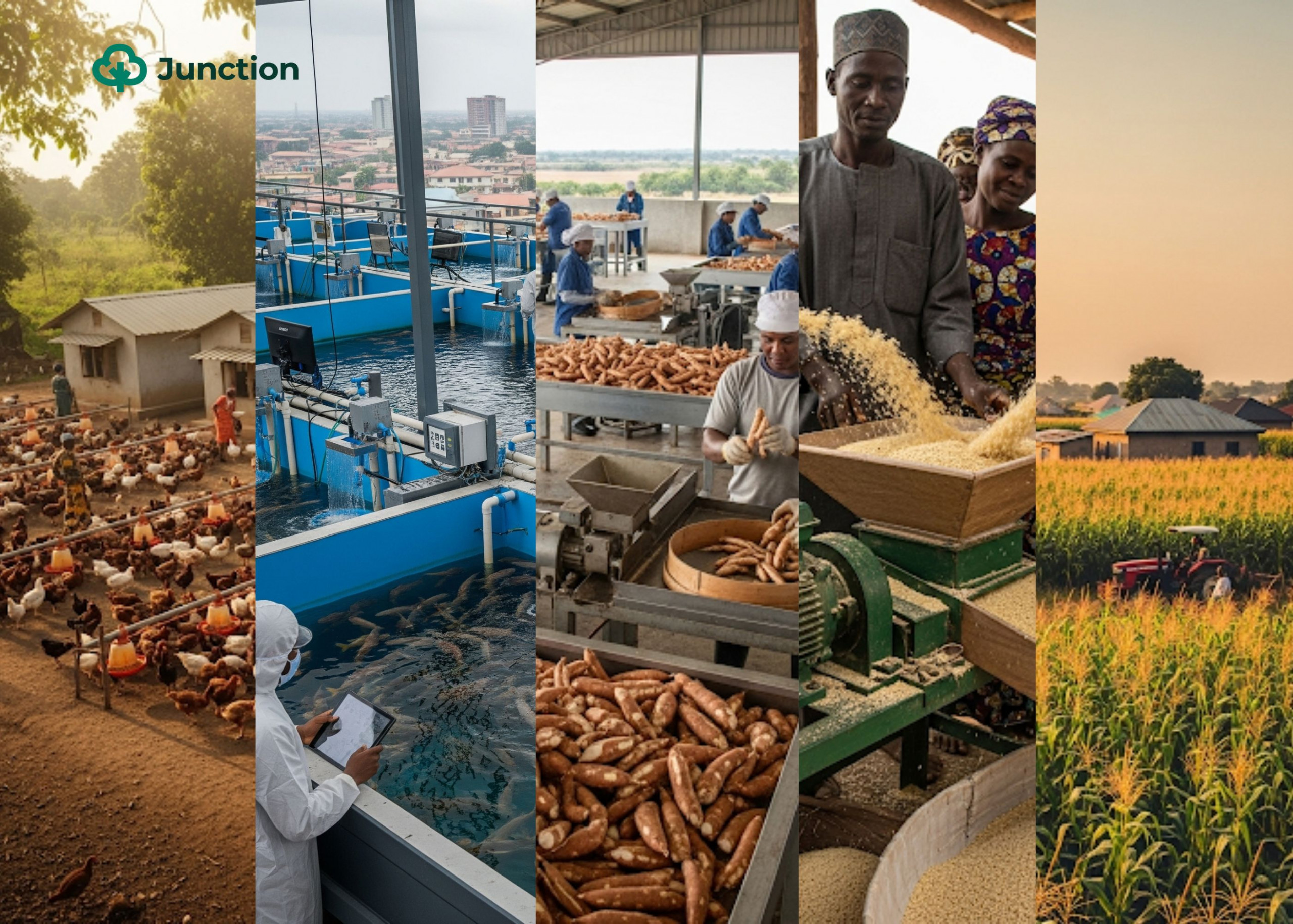Agro-value addition refers to transforming raw farm products into more valuable forms through agro-processing activities such as cleaning, packaging, preserving, or manufacturing them into finished goods.
It moves commodities from their raw state (like fresh milk, grains, or meat) into products that are more marketable, longer-lasting, and often ready for consumer use, such as flour, packaged meats, or canned foods.
Agro-processing is becoming increasingly vital to Nigeria’s economic future and the African continent as a whole, especially in the livestock sector.
Urbanisation and a growing middle class across Africa are driving up demand for convenient, ready-to-cook, and hygienically packaged food products. In Nigeria, the livestock sector is seeing an increase in demand for processed dairy (like cheese and yoghurt), packaged poultry, and meat products, creating new opportunities for farmers and agribusinesses to tap into higher-value markets.
It can also create more jobs than primary agriculture. From factory workers to logistics and marketing roles, developing value chains in livestock (such as abattoirs, cold chain services, and meat packaging) can generate millions of jobs across rural and urban areas. This is critical in Nigeria, where youth unemployment remains high.
Nigeria’s historic reliance on crude oil is increasingly risky amid global shifts towards renewable energy and volatile oil prices. Expanding agro-processing industries — particularly in livestock and crop sectors — is seen as a key strategy for diversifying the economy, boosting non-oil exports, and enhancing food security.
Worldwide, consumers are favouring processed and branded agricultural products that offer safety, traceability, and convenience. The government should respond by investing in agro-industrial parks, livestock processing hubs, and policies that encourage local value addition.
Agro-value addition is becoming essential for creating wealth, strengthening food systems, and securing Nigeria’s place in a rapidly modernising global economy, especially through livestock and other high-demand sectors.
Nigeria’s agro-processing potential and benefits
Nigeria is one of Africa’s agricultural powerhouses, with impressive output across multiple crops, especially in production.

Despite these strong production figures, Nigeria often loses value because raw agricultural goods are exported or wasted instead of being processed into higher-value products.
When agricultural products are sold raw, Nigeria captures only a fraction of their potential value. Several key challenges include:
- Post-harvest losses: According to various estimates, Nigeria loses 30–50% of its agricultural output post-harvest due to poor storage, handling, and lack of immediate processing.
- Raw vs. processed exports: Raw sesame, cocoa, and cashew exports dominate, while other countries (like Vietnam for cashew or Belgium for cocoa) earn far more by processing these products into high-value finished goods.
- Limited domestic industries: Insufficient local investment in processing facilities and weak infrastructure mean Nigeria misses out on job creation, rural industrialisation, and export revenues.
For example, Nigeria is the 5th largest global producer of sesame seeds but only the 8th largest exporter.
In 2023, it exported ₦253.7 billion worth of sesame seeds and ₦612.7 billion in 2024, according to the National Bureau of Statistics (NBS). Despite this surge, most sesame is exported raw. Nigeria could fetch higher export prices and enter premium markets by investing in ordinary cleaning, grading, packaging, and oil extraction.
In 2024, Nigeria exported ₦2.712 trillion worth of cocoa products — a 592.72% increase over 2023. Natural cocoa butter saw the highest growth (+762.19%). Yet, raw cocoa beans still dominate exports (₦2.4 trillion worth), highlighting the untapped potential for finished chocolate, cosmetics, and related industries.
Nigeria produces about 240,000 metric tons of cashew nuts annually, expected to hit 300,000 tons by 2030. However, 85% of Nigerian cashew nuts are exported raw to countries like Vietnam and India.
Vietnam processes these raw nuts into butter, milk, flour, and cosmetics, generating $4.37 billion from cashew kernel exports in 2024, while Nigeria captures minimal value.
Why agro-processing matters now more than ever
- Rising Demand for Processed Foods:
Urbanisation and changing lifestyles across Nigeria and Africa are increasing the appetite for packaged, ready-to-eat, and value-added products. - Massive Job Creation:
Processing industries create jobs at every stage — from manufacturing to logistics to marketing — helping absorb Nigeria’s large, youthful workforce. - Economic Diversification:
With crude oil revenues volatile and declining globally, expanding agro-processing is critical for non-oil export growth and economic resilience. - Global Trade Opportunities:
Countries demand high-quality, value-added products rather than raw goods. Investing in local processing will enable Nigeria to compete globally and command better prices.
Agro-processing opportunities across value chains
Processing opportunities are expanding rapidly across Nigeria’s agricultural value chains, offering promising investment and job creation potential.
In grains and cereals, ventures like rice milling and maize flour production are highly attractive, especially given Nigeria’s heavy local consumption of these staples. In the fruits and vegetables sector, businesses focused on fruit juices, purees, and dried fruits are gaining ground, fueled by rising urban demand for healthier, convenient food options.
Similarly, in oilseeds and nuts, there is strong potential in palm oil processing, groundnut oil extraction, and sesame oil production, all of which have growing domestic and export markets.
Importantly, many of these agro-processing opportunities can be tapped through low-to-medium capital models, making them accessible even to small entrepreneurs. Cottage industries producing cassava derivatives like garri, starch, and High Quality Cassava Flour (HQCF) can thrive with simple, affordable equipment.
Mobile processors — small, transportable milling or pressing units — offer flexibility for rural areas, allowing farmers to process products near the point of harvest. Shared processing facilities (cooperatively owned or leased) also help lower the cost barriers for startups and farmer groups by providing access to machinery without requiring full ownership.
This venture can be aimed at export markets, presenting even greater rewards, but also demands higher standards. Producers must meet international packaging standards, ensure proper labelling, and secure certifications such as Good Manufacturing Practices (GMP), Hazard Analysis and Critical Control Points (HACCP), and organic certifications where needed.
These measures not only open doors to premium markets in Europe, North America, and Asia but also improve product shelf life and consumer trust. By strategically investing in both production quality and export readiness, Nigerian agro-processors can significantly boost foreign exchange earnings and position themselves competitively on the global stage.
What you need to start
Starting an agro-processing business in Nigeria requires the right mix of equipment, skills, and regulatory compliance.
Essential machinery will vary depending on the product line.
- For grains and cereals, you’ll need dehullers, milling machines, and packaging equipment.
- Fruit and vegetable processors require juice extractors, dryers, and sealers.
- Oilseed and nut processors depend on expellers, filters, and refining units.
Beyond machines, basic skills in food safety, hygiene practices, and product development are critical to ensure your products meet health standards and appeal to target markets. Business owners and staff should undergo training programs to build competency in these areas early on.
To operate legally and competitively, securing certifications is non-negotiable. Agro-processors must obtain approvals from NAFDAC (National Agency for Food and Drug Administration and Control) and quality marks from SON (Standards Organisation of Nigeria).
For exporters, registration with the NEPC (Nigerian Export Promotion Council) and compliance with phytosanitary certifications are necessary.
Quality control at every stage, from sourcing raw materials to final packaging, will distinguish your brand and build customer trust.
Location choice is also key — access to a reliable water supply, power, and proximity to logistics hubs (roads, seaports) will determine operational efficiency and costs.
Investing early in good branding, clear labelling, and packaging that meet global standards can significantly boost your product’s visibility and value.
Marketing and distribution strategies
Effective marketing and distribution are crucial to the success of agro-processing businesses.
Domestically, processed products can be sold through supermarkets, local retailers, wholesalers, and increasingly, through online platforms like Jumia, Konga, and social media marketplaces.
Building relationships with local stores and participating in farmers’ markets can help smaller brands gain visibility and trust. For export markets, tapping into B2B platforms like Alibaba, buyer directories (e.g., Trade Map, ImportGenius), and attending international trade shows such as the Lagos International Trade Fair or the World Food Moscow Expo can connect Nigerian agro-processors with global buyers. Identifying niche markets — such as African stores abroad — is another smart strategy.
Strong packaging, accurate labelling, and compelling storytelling significantly enhance a product’s appeal.
Packaging must not only protect the product but also meet regulatory standards and convey quality. Labels should highlight attributes like “locally made,” “organic,” “women-led,” or “community-sourced” to attract value-driven consumers both locally and internationally.
For distribution, agro-processors can grow faster by partnering with aggregators, joining export cooperatives, or collaborating with distribution networks that already serve multiple outlets. This reduces costs, expands reach, and provides smaller businesses with the market muscle needed to scale sustainably.
Challenges
Profiting from agro-value addition in Nigeria comes with notable challenges. Unreliable power supply and poor infrastructure, such as bad roads and limited cold storage, raise production costs and cause post-processing losses. Access to finance is another major hurdle, as many small-scale processors struggle to obtain affordable loans or credit to expand operations or invest in better equipment. Additionally, poor market linkages often leave processors disconnected from larger buyers and export opportunities, forcing them to sell at low margins within local markets.
However, practical solutions are emerging. Many agro-entrepreneurs are now adopting solar-powered solutions to minimise energy costs and avoid power disruptions. Institutions like the Bank of Industry (BOI) offer tailored loan programs for agro-processors, while joining or forming farmer and SME cooperatives can improve bargaining power and access to funding. Finally, public-private partnerships (PPPs) are helping to upgrade rural infrastructure and create market hubs that connect producers directly with large buyers, exporters, and retailers. Tapping into these support systems can significantly boost profitability and resilience in agro-processing businesses.
Conclusion
Agro-value addition presents a significant opportunity for Nigeria to diversify its economy, create jobs, and boost food security by processing raw agricultural products into higher-value items. By investing in processing technologies and infrastructure, Nigeria can capture more value from its agricultural outputs, strengthen its position in global markets, and contribute to sustainable economic growth.



